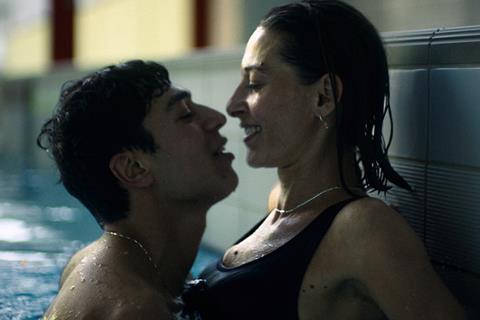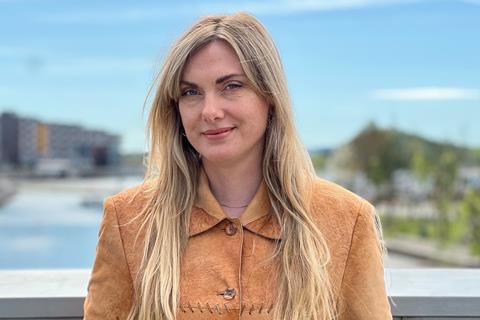
Norwegian director Nina Knag’s Don’t Call Me Mama centres on Eva, a respected pillar of the community and wife of the town’s mayor, who becomes involved with asylum seekers who have come to the area. One of these is 18-year-old Amir with whom she soon begins an affair. Both must soon face the consequences of their forbidden liaison.
The film is set to world premiere in the main Crystal Globe competition at the Karlovy Vary International Film Festival on Wednesday (July 9).
Knag has a number of highly regarded short films behind her as well as experience directing series for Norwegian TV. Hopes are high for the film after fellow Norwegian director Lilja Ingolfsdottir’s Loveable became one of the buzziest titles at Karlovy Vary last year.
Don’t Call Me Mama is produced by Eléonore Anselme and Ingrid Skagestad for Norway-based The Global Ensemble Drama. The film stars Pia Tjelta as Eva and Tarek Zayat as Amir. Sales are handled by Denmark’s REinvent. Scanbox Entertainment is distributing in the Nordics.
Where did the inspiration for Don’t Call Me Mama come from?

Nina Knag: The idea emerged while I was doing research for a TV drama about asylum politics and I came across some news stories about Norwegian women who volunteered at asylum centres and ended up in sexual relationships with young male asylum seekers. I had previously met both young asylum seekers and the women who helped them, and it had never crossed my mind that this could happen. I was shocked at first – but then I started asking myself: what drives someone to cross such boundaries? That became the starting point for exploring a relationship where love, power, and the need to be seen begin to blur.
This is your debut feature – can you tell us about the road you took to get together the funding?
It’s been a long journey. I got the idea in 2018, and now, almost seven years later, the film is finally ready for its premiere. Writing the script was a long process – for me, the script is always the hardest part, and I really needed time to get under the skin of my main character, Eva. Once I felt I had a clear and compelling story, I pitched it to producer Eleonore Anselme. She immediately connected with the project and has been an invaluable creative partner since. We received support from the Norwegian Film Institute (NFI)’s talent program NEO, which supports innovative debut features.
The support we received from NFI helped cover about half the budget [The film’s total budget was €1.1m (NOK13m)]. At the same time, I had a baby and was on maternity leave while my producer continued working on the financing – it was a long process, but we encountered a lot of enthusiasm and support. Both the distributor and sales agent contributed significantly in early stages, which I see as a major vote of confidence.
Tell us more about the casting of Pia Tjelta and Tarek Zayat
Pia wasn’t the first name we considered – I thought she might be too young for the role. We also encountered some hesitation from actors because of the subject matter. Eventually, my co-casting director Camilla Glaister and I decided to approach Pia, who is truly one of Norway’s best actresses. She read the project materials and said: “Finally! A director who wants to say something important.” That’s when I knew she was the right choice.
Amir was harder to find. We looked in Norway, but eventually searched Sweden and Denmark. I remembered Tarek from a film called Enforcement – he was excellent. When I saw how he had matured, I had a gut feeling he was our Amir. He came to Oslo for an audition with Pia. Shortly after, she called me and said the chemistry between them was so strong, she would have given him the part immediately. That meant a lot to me, I could not have cast him without Pia being so sure.
How conscious were of trying to balance the tonal elements of the film?
Eva is a character who both fascinates and unsettles me - she forces us to confront uncomfortable truths about longing, freedom and identity. I’m drawn to her contradictions, and I want the audience to feel that same ambivalence: to recognise the fragile line between empathy and judgment; desire and destruction.
That balance and complexity was something I worked on continuously – from the script to editing, and all the way through post-production, music and sound. I wanted to highlight structural and societal power dynamics.
I believe audiences can handle complexity – that we can stay in the grey zones and portray whole human beings with good and bad sides, without offering clear answers. I want to raise difficult questions about power, morality and what it means to feel truly seen - especially at a time in life when many women begin to feel invisible.
What will you be working on next?
I’m currently developing a youth film that also deals with forbidden love – but in a completely different universe. I’m also writing a more personal project inspired by grief, loss and new love. Maybe, in the end, it will become a trilogy about boundaryless relationships.

























No comments yet